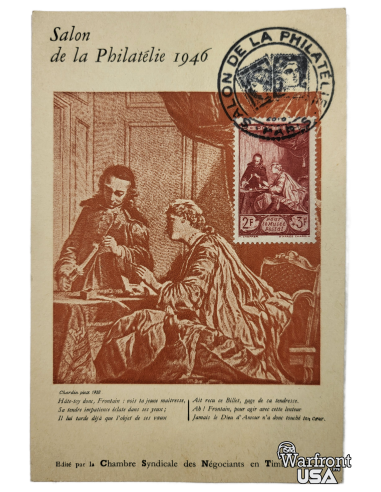"Salon de la Philatélie 1946", indicating this card was issued for or related to the stamp fair held that year.
Two individuals in a scene reminiscent of an 18th-century French painting, one lighting a candle while the other sits on a chair, suggesting a moment of intimacy or anticipation.
Below the image, there's a poetic excerpt, "Chardin Pinx 1732 Hate-toy donc, Frontain: vois ta jeune maîtresse, sa tendre impatience éclate dans ses yeux ; il lui tarde déjà que l’objet de ses vœux ait reçu ce billet, gage de sa tendresse. Ah! Frontain, pour agir avec cette lenteur, jamais le dieu d'amour n'a donc touché ton cœur." This references Jean-Baptiste-Siméon Chardin's work, alluding to themes of love, impatience, and affection, paralleling the act of sending messages through stamps.
"Édité par la Chambre Syndicale des Négociants en Timbres" (Published by the Union of Stamp Dealers), showcasing the involvement of philatelic professionals in the event.
Features one stamp of 2 Francs "pour le musée postal" (+ 3 Francs surcharge), likely a special issue for the museum or the event.
Postmark: Bears the "Salon de la Philatélie Paris", tying it directly to the stamp exhibition.
No message written, indicating it was either kept as a souvenir or never used for mailing.
"Carte Postale" with fields for "Expéditeur" (Sender) and "Adresse" (Address), but left empty.
"Imp. Blondel la Rougery - Paris", identifying the printer.
Historical Context: This card reflects a moment of cultural revival in France post-WWII, where philately was celebrated as both a hobby and a link to historical and artistic heritage. The artistic choice and literary quote connect philately with broader cultural narratives.
Condition: It might exhibit some wear, fading, or minor damage.
Historical Significance: Valuable for collectors of WWII memorabilia, French postal history, or those interested in art and literature in philately, highlighting the intersection of stamp collecting with cultural expression. Provides insights into how France sought to rebuild its cultural identity post-war through events like the Salon de la Philatélie, emphasizing the role of stamps as cultural artifacts.
Note: This postal card is not only a piece of philatelic history but also a cultural artifact that captures the spirit of post-war France's engagement with art, literature, and community through the lens of stamp collecting.











